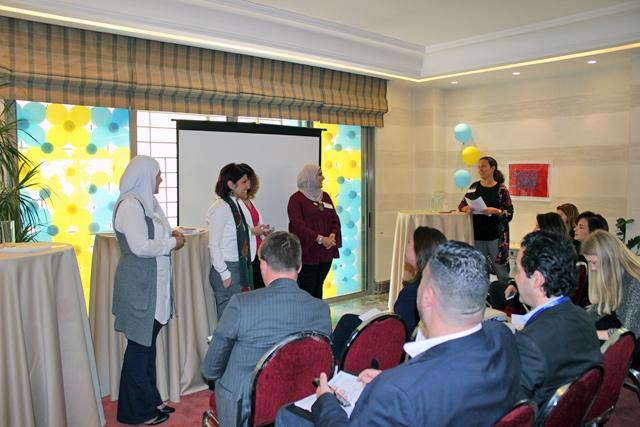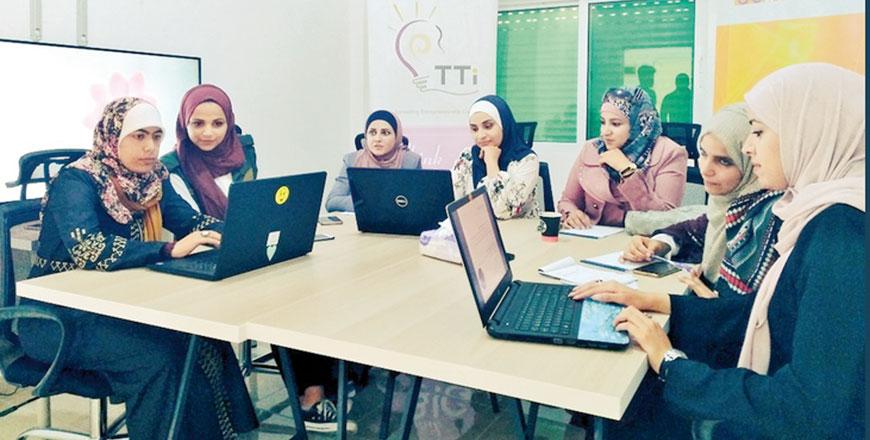You are here
Stakeholders review Jordan’s women entrepreneurial ecosystem
By Camille Dupire - May 14,2018 - Last updated at May 14,2018

Entrepreneurs, government officials, private sector representatives and donor countries take part in a seminar on women’s entrepreneurship at the Swedish ambassador’s residence recently (Photo courtesy of Swedish embassy)
AMMAN — Over 77 entrepreneurs, government officials, private sector representatives, national and international civil society organisations and donor countries last week gathered to review the state of women’s entrepreneurship in Jordan, and discuss a long term approach in this regard.
Organised by the embassy of Sweden under the title “Women’s Entrepreneurship — Impact, Obstacles and Actions Ahead”, the seminar sought to “create a brief overview of the activities and support systems currently in place for Jordanian women entrepreneurs” and to “identify ways to strengthen the leverage of women’s entrepreneurship and female owned businesses in the country”, according to Sara Lundgren from the Swedish embassy.
“It is sometimes said that cash is king. I prefer to say that cash is queen,” started Swedish Ambassador Erik Ullenhag in his opening remarks, stressing that women are “the missing resource the Jordanian economy needs to reach its full potential”.
Commending the “true role models” present at the event, he said: “Their energy and ideas can move mountains. Think about the possibilities of skilled talents we can add to Jordan if the percentage of women in the labour force moved from the current 17 per cent to 50 or 70 per cent.”
“Although a majority of university graduates in Jordan are women, in 2017, only 17.3 per cent of working age women participated in the country’s labour force, while 60.8 per cent of men did, pointed Manal Sweidan from the National Statistics Department.
She briefed the participants, which included a number of emerging and established Jordanian female entrepreneurs and business leaders, on the current state of the national labour market, highlighting the low labour market participation rate among women, which attendees agreed is “a major waste of a great human resource” hampering the national economy and reducing growth.
After sharing their personal experiences and insights into the local entrepreneurship ecosystem, participants went on to discuss the challenges and opportunities women face in Jordan when starting their own businesses.
Fida Taher from Women in Business in Arabia, a network of over 30,000 members, presented the results of a recent survey conducted within the network, which showed that only 30 per cent of respondents claimed to have “strong female role models” in the business field.
“We thought of this event as a great way to connect all the actors working in the field, to help them meet and create new synergies to further their understanding of ‘what is going on’ in the entrepreneurial ecosystem,” Lundgren told The Jordan Times, highlighting the multiplicity of actors who might not be in touch with one another.
“A great variety of actors got the chance to network at the event, such as incubators like Oasis500 and Zain ZINC, the CEO of Bank al Etihad, representatives of donor countries like USAID or GIZ, among many others,” she continued.
Maha Bahou from the Central Bank of Jordan, underlined the importance of the financial inclusion of women, and their participation in the formal economy, citing the bank’s “Mobile Money for Resilience” initiative as an example of ways to make more Jordanian women bankable.
“Cash is king but digital money is queen,” she paraphrased with humour.
Several key takeaways were formulated at the seminar, including the importance of female role models in the business sector, the creation of an enabling regulatory environment, the access to capital and networks, as well as the need for a holistic and long-term approach in supporting female entrepreneurs.
“It is highly important to support women entrepreneurs in the long run, and not only focus on the start up phase,” stressed Lundgren, noting that “the power of entrepreneurship lies in its sustainability and long term impact both for the business owner and the community”.
Participants highlighted the necessity of fostering an “entrepreneurial spirit” from an early age, especially among women, through training of business skills in the education system. They suggested that universities reach out to the youth with coaching and mentoring programmes for entrepreneurs.
Discussions also focused on the issue of decentralisation, pointing out the need to expand support systems to areas outside of Amman, following the models developed by actors like the EU funded business accelerator ShamalStart in Irbid and Mafraq, and the Business Development Centre which counts hubs across the Kingdom.
“The concentration of incubators, networks and support programmes in Amman makes for an uneven playing field, putting actors outside of the capital at a disadvantage,” an embassy official said, noting that many donors agreed that much remains to be done to support business opportunities in underserved Jordanian governorates, pooling resources with existing community centres.
The various takeaways are set to be outlined in an overview report by the Swedish embassy, which defined the event as “a very first step on a much longer path towards supporting the potential of Jordan’s female entrepreneurs”.
Related Articles
AMMAN — Jordanian women face social, economic and structural challenges that reduce their chances of growing a business within the Kingdom’s
AMMAN — People who want to innovate do not necessarily know where to start and often need a bit of guidance to be able to unleash their entr
AMMAN — Aghast by the fact that over 90 per cent of the content generated on the online platform Wikipedia is created by men, the Swedish em


















